Cairo: Deep rifts opened in Moammar Gaddafi's regime, with Libyan government officials at home and abroad resigning, air force pilots defecting and a bloody crackdown on protest in the capital of Tripoli, where cars and buildings were burned. Gaddafi went on state TV early Tuesday to attempt to show he was still in charge.
World leaders expressed outrage Monday at the "vicious forms of repression" used against the demonstrators.
The mercurial leader appeared briefly on TV to dispel rumors that he had fled. Sitting in a car in front of what appeared to be his residence and holding an umbrella out of the passenger side door, he told an interviewer that he had wanted to go to the capital's Green Square to talk to his supporters, but the rain stopped him.
"I am here to show that I am in Tripoli and not in Venezuela. Don't believe those misleading dog stations," he said, referring to the media reports that he had left the country. The video clip and comments lasted less than a minute -- unusual for Gaddafi, who is known for rambling speeches that often last hours.
Pro-Gaddafi militia drove through Tripoli with loudspeakers and told people not to leave their homes, witnesses said, as security forces sought to keep the unrest that swept eastern parts of the country -- leaving the second-largest city of Benghazi in protesters' control -- from overwhelming the capital of 2 million people.
State TV said the military had "stormed the hideouts of saboteurs" and urged the public to back security forces. Protesters called for a demonstration in Tripoli's central Green Square and in front of Gaddafi's residence, but witnesses in various neighborhoods described a scene of intimidation: helicopters hovering above the main seaside boulevard and pro-Gaddafi gunmen firing from moving cars and even shooting at the facades of homes to terrify the population.
Youths trying to gather in the streets scattered and ran for cover amid gunfire, according to several witnesses, who like many reached in Tripoli by The Associated Press spoke on condition of anonymity for fear of reprisal. They said people wept over bodies of the dead left in the street.
Warplanes swooped low over Tripoli in the evening and snipers took up position on roofs, apparently to stop people outside the capital from joining protests, according to Mohammed Abdul-Malek, a London-based opposition activist in touch with residents.
Gaddafi appeared to have lost the support of at least one major tribe, several military units and his own diplomats, including the delegation to the United Nations. Deputy U.N. Ambassador Ibrahim Dabbashi accused the longest-serving Arab leader of committing genocide against his own people in the current crisis.
The eruption of turmoil in the capital after seven days of protests and bloody clashes in Libya's eastern cities sharply escalated the challenge to Gaddafi. His security forces have unleashed the bloodiest crackdown of any Arab country against the wave of protests sweeping the region, which toppled leaders of Egypt and Tunisia. At least 233 people have been killed so far, according to New York-based Human Rights Watch. The difficulty in getting information from Libya made obtaining a precise death toll impossible.
Secretary of State Hillary Rodham Clinton called on Gaddafi to "stop this unacceptable bloodshed" and said the world was watching the events "with alarm."
British Prime Minister David Cameron, visiting neighboring Egypt, called the crackdown "appalling."
"The regime is using the most vicious forms of repression against people who want to see that country -- which is one of the most closed and one of the most autocratic -- make progress," he said.
Communications to Tripoli appeared to have been cut, and residents could not be reached by phone from outside the country. State TV showed video of hundreds of Gaddafi supporters rallying in Green Square, waving palm fronds and pictures of him.
State TV quoted Gaddafi's son, Seif al-Islam, as saying the military conducted airstrikes on remote areas, away from residential neighborhoods, on munitions warehouses, denying reports that warplanes attacked Tripoli and Benghazi.
Jordanians who fled Libya gave horrific accounts of a "bloodbath" in Tripoli, saying they saw people shot, scores of burned cars and shops, and what appeared to be armed mercenaries who looked as if they were from other African countries.
Many billboards and posters of Gaddafi were smashed or burned along a road to downtown Tripoli, "emboldening" protesters, said a man who lives on the western outskirts of the capital.
The first major protests to hit an OPEC country -- and major supplier to Europe -- sent oil prices jumping, and the industry has begun eyeing reserves touched only after Hurricane Katrina in 2005 and the first Gulf War in 1991.
Tripoli was largely shut down Monday, with schools, government offices and most stores closed, except for a few bakeries, said residents, who hunkered down in their homes. Armed members of pro-government organizations called "Revolutionary Committees" hunted for protesters in Tripoli's old city, said one protester named Fathi.
Members of the militia occupied the city center and no one was able to walk in the street, said one resident who lived near Green Square and described a "very, very violent" situation.
"We know that the regime is reaching its end and Libyans are not retreating," the resident said. "People have a strange determination after all that happened."
The heaviest fighting so far has been in the east. Security forces in Benghazi opened fire Sunday on protesters storming police stations and government buildings. But in several instances, units of the military sided with protesters.
By Monday, protesters had claimed control of the city, overrunning its main security headquarters, called the Katiba.
Celebrating protesters raised the flag of Libya's old monarchy, toppled in 1969 in a Gaddafi-led military coup, over Benghazi's main courthouse and on tanks around the city.
"Gaddafi needs one more push and he is gone," said lawyer Amal Roqaqie.
Gaddafi's son went on state TV early Monday with a sometimes confused speech of nearly 40 minutes, vowing to fight and warning that if protests continue, a civil war will erupt in which Libya's oil wealth "will be burned."
"Moammar Gaddafi, our leader, is leading the battle in Tripoli, and we are with him," he said. "The armed forces are with him. Tens of thousands are heading here to be with him. We will fight until the last man, the last woman, the last bullet," Seif al-Islam Gaddafi said.
He also promised "historic" reforms if protests stop. State TV said Monday he had formed a commission to investigate deaths during the unrest. Protesters ignored the vague gestures. Even as he spoke, the first clashes between demonstrators and security forces in the heart of Tripoli were still raging, lasting until dawn.
Fire raged Monday at the People's Hall, the main building for government gatherings where the country's equivalent of a parliament holds sessions several times a year, the pro-government news website Qureyna said.
It also reported the first major sign of discontent in Gaddafi's government, saying Justice Minister Mustafa Abdel-Jalil resigned to protest the "excessive use of force" against unarmed demonstrators.
There were reports of ambassadors abroad defecting. Libya's former ambassador to the Arab League in Cairo, Abdel-Moneim al-Houni, who resigned his post Sunday to side with protesters, demanded Gaddafi and his commanders and aides be put on trial for "the mass killings in Libya."
"Gaddafi's regime is now in the trash of history because he betrayed his nation and his people," al-Houni said in a statement.
A Libyan diplomat in China, Hussein el-Sadek el-Mesrati, told Al-Jazeera, "I resigned from representing the government of Mussolini and Hitler."
Two Mirage warplanes from the Libyan air force fled a Tripoli air base and landed on the nearby island of Malta, and their pilots -- two colonels -- asked for political asylum, Maltese military officials said.
A protest march Sunday night sparked scenes of mayhem in the heavily secured capital. Protesters had streamed into Green Square, all but taking over the plaza and surrounding streets in the area between Tripoli's Ottoman-era old city and its Italian-style downtown.
That was when the backlash began, with snipers firing from rooftops and militiamen attacking the crowds, shooting and chasing people down side streets, according to witnesses and protesters.
Gaddafi supporters in pickup trucks and cars raced through the square, shooting automatic weapons. "They were driving like madmen searching for someone to kill. ... It was total chaos, shooting and shouting," said a 28-year-old protester.
The witnesses reported seeing casualties, but the number could not be confirmed. The witness named Fathi said he saw at least two he believed were dead and many more wounded. After midnight, protesters took over the main Tripoli offices of state-run satellite stations Al-Jamahiriya-1 and Al-Shebabiya, a witness said.
"Gunfire was echoing across the capital all night last night," said Adel Suleiman, a Jordanian adviser to the Libyan Central Bank governor.
"I saw scores of burned cars and shops in the capital," said Suleiman, who was among about 260 Jordanians evacuated from Tripoli.
Mahmoud Shawkat, a 28-year-old computer engineer, said his Libyan neighbor was shot in the head during a protest in Green Square. "I'm not sure if he died," Shawkat said. "I had to flee to the airport."
A Jordanian engineer who identified himself as Abu Saleh, 30, said armed militias were in Green Square on Monday morning, and many of them appeared to be foreigners from other parts of Africa "who were shooting randomly at people and in the air. Some of them were carrying swords."
He said he also saw bloodstains on the road on my way to the airport and "pictures of Gaddafi were also torched."
Fragmentation is a real danger in Libya, a country of deep tribal divisions and a historic rivalry between Tripoli and Benghazi. The system of rule created by Gaddafi -- the "Jamahiriya," or "rule by masses" -- is highly decentralized, run by "popular committees" in a complicated hierarchy that effectively means there is no real center of decision-making except Gaddafi, his sons and their top aides.
An expert on Libya said she believed the regime was collapsing.
"Unlike the fall of the regime in Tunisia and Egypt, this is going to be a collapse into a civil war," said Lisa Anderson, president of the American University in Cairo, and a Libya expert.
Seif has often been put forward as the regime's face of reform and is often cited as a likely successor. His younger brother, Mutassim, is the national security adviser, with a strong role in the military and security forces. Another brother, Khamis, heads the army's 32nd Brigade, which according to U.S. diplomats is the best-trained and best-equipped force in the military.
In Benghazi, cars honked their horns in celebration and protesters in the streets chanted "Long live Libya" on Monday, a day after bloody clashes that killed at least 60 people.
Benghazi's airport was closed, according to an airport official in Cairo. A Turkish Airlines flight trying to land in Benghazi to evacuate Turkish citizens was turned away Monday, told by ground control to circle over the airport, then to return to Istanbul.
There were fears of chaos as young men -- including regime supporters -- seized weapons from the Katiba and other captured security buildings. "The youths now have arms and that's worrying," said Iman, a doctor at the main hospital. "We are appealing to the wise men of every neighborhood to rein in the youths."
Youth volunteers directed traffic and guarded homes and public facilities, said Najla, a lawyer and university lecturer in Benghazi. She and other residents said police had disappeared from the streets.
After seizing the Katiba, protesters found the bodies of 13 uniformed security officers inside who had been handcuffed and shot in the head, then set on fire, said a doctor named Hassan, who asked not to be identified further for fear of reprisals. He said protesters believed the 13 had been executed by fellow security forces for refusing to attack protesters.
Tunisia's official news agency said at least 2,300 Tunisians fled neighboring Libya on Sunday and Monday out of concerns over the unrest, crossing at the border post of Ras Jedir. Other reports suggest the figure was much higher.
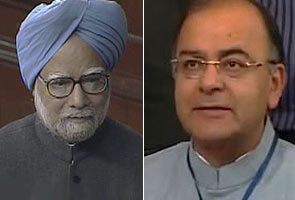
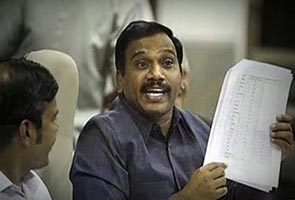
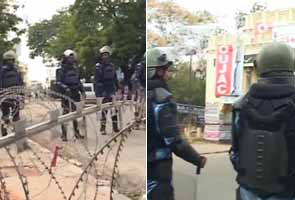
 Australian skipper Ricky Ponting smashed an LCD television set in the team's dressing room here, apparently in a fit of anger, after he got run out against Zimbabwe, sources in the Gujarat Cricket Association (GCA) said on Tuesday.
Australian skipper Ricky Ponting smashed an LCD television set in the team's dressing room here, apparently in a fit of anger, after he got run out against Zimbabwe, sources in the Gujarat Cricket Association (GCA) said on Tuesday.

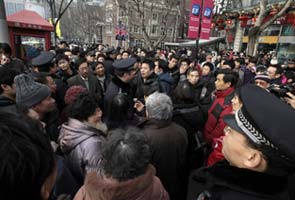
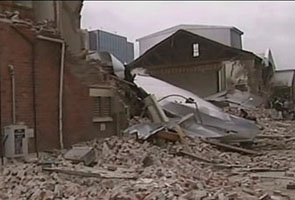

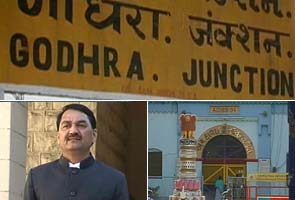
 Click to Expand & Play
Click to Expand & Play